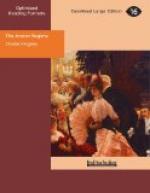But the mania was general. The high-born and the virtuous expected to discover some panacea for their own consciences in what Voss calls, “A multitude of symbols, which are ever increasing the farther you penetrate, and are made to have a moral application through some arbitrary twisting of their meaning, as if I were to attempt expounding the chaos on my writing-desk.”
A rich harvest-field was an aristocracy in such a humour, for quacks of every kind; richer even than that of France, in that the Germans were at once more honest and more earnest, and therefore to be robbed more easily. The carcass was there: and the birds of prey were gathered together.
Of Rosa, with his lodge of the Three Hammers, and his Potsdam gold-making;—of Johnson, alias Leuchte, who passed himself off as a Grand Prior sent from Scotland to resuscitate the order of Knights Templars; who informed his disciples that the Grand Master Von Hund commanded 26,000 men; that round the convent (what convent, does not appear) a high wall was erected, which was guarded day and night; that the English navy was in the hands of the Order; that they had MSS. written by Hugo de Paganis (a mythic hero who often figures in these fables); that their treasure was in only three places in the world, in Ballenstadt, in the icy mountains of Savoy, and in China; that whosoever drew on himself the displeasure of the Order, perished both body and soul; who degraded his rival Rosa to the sound of military music, and after having had, like every dog, his day, died in prison in the Wartburg;—of the Rosicrucians, who were accused of wanting to support and advance the Catholic religion—one would think the accusation was very unnecessary, seeing that their actual dealings were with the philosopher’s stone, and the exorcism of spirits: and that the first apostle of the new golden Rosicrucian order, one Schropfer, getting into debt, and fearing exposure, finished his life in an altogether un-catholic manner at Leipsic in 1774, by shooting himself;—of Keller and his Urim and Thummim;—of Wollner (who caught the Crown Prince Frederick William) with his three names of Chrysophiron, Heliconus, and Ophiron, and his fourth name of Ormesus Magnus, under which all the brethren were to offer up for him solemn prayers and intercessions;—of Baron Heinrich von Ekker and Eckenhofen, gentleman of the bed-chamber and counsellor of the Duke of Coburg Saalfeld, and his Jewish colleague Hirschmann, with their Asiatic brethren and order named Ben Bicca, Cabalistic and Talmudic; of the Illuminati, and poor Adam Weisshaupt, Professor of Canon and National Law at Ingoldstadt in Bavaria, who set up what he considered an Anti-Jesuitical order on a Jesuit model, with some vague hope, according to his own showing, of “perfecting the reasoning powers interesting to mankind, spreading the knowledge of sentiments both humane and social, checking wicked inclinations, standing up for oppressed and suffering




